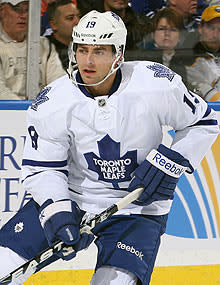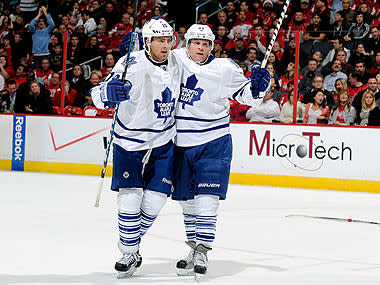Toronto's Joffrey Lupul: A lot more than a comeback
TORONTO – On the hard wooden bench in the Toronto Maple Leafs' dressing room, there rests the only evidence that Joffrey Lupul ever had a back problem. It comes in the form of a foam pad, light blue, a couple of inches thick, designed to keep his spine aligned. He said he uses it now because it's "just more comfortable," and his teammates tease him, calling it the La-Z-Boy.
But there is nothing lazy about Lupul, and that's why you would never know about the surgeries, the mysterious infection, the IV antibiotics, all the doctors and specialists and physical therapists, the year out of hockey. Lupul is playing a power game on the left wing, and he is producing like he never has before. He has not only made a comeback. He has gotten better.
Look at the NHL scoring leaders: No. 1 is the Pittsburgh Penguins' Evgeni Malkin, a former scoring champion, with 54 points. Next is the Vancouver Canucks' Henrik Sedin, a former scoring champion, with 52 points. Then there is Lupul with 51 points, tied for third with two of the most dynamic players in the game – the Tampa Bay Lightning's Steven Stamkos and the Detroit Red Wings' Pavel Datsyuk.
Lupul has clicked with teammate Phil Kessel, who is only one point behind, and he is on pace for 35 goals and 90 points, which would shatter his personal bests. He needs only two points to tie his career high. No wonder he has been mentioned for the Masterton Trophy, awarded annually to the player who best exemplifies perseverance, sportsmanship and dedication.
"People take credit for players' success a lot in our game," said Dave Nonis, the Leafs' senior vice-president of hockey operations. " 'It was the coach.' 'It was this.' 'It was his linemates.' I think Joffrey deserves the credit for his success. Yes, he's got players who have played well with him. But he put the time in and the work in, and he prepared for the season as hard as any player we have on our team."
You don't take the game for granted when it was almost taken from you.
Lupul was playing for the Anaheim Ducks in 2009-10 when he had surgery to repair a herniated disc in his lower back. It was supposed to be routine. His recovery was supposed to take weeks, not months, not a year. Lupul – the seventh overall pick in the 2002 draft, already a six-year NHL veteran at age 26 – was supposed to have a bright future in front of him.
But then he needed a second surgery. And then he developed an infection. And then he spent six weeks taking intravenous antibiotics three hours a day. And then – just when he thought everything was fine, just when he started to rehab – he didn't come back. The infection did. Eight more weeks of IV antibiotics three hours a day.
Totaling up the IV time, Lupul said: "That was basically 14 weeks of doing nothing."
He wanted to do something. He feared the worst. He went from doctor to doctor, specialist to specialist, physical therapist to physical therapist.
"I saw everyone," he said. "I was trying to fix it."
But no one really knew what to tell him.
The recurring infection, Lupul said, "was kind of something new to them. So that was frustrating. As a professional athlete, all your injuries always have a timetable with them – three to four weeks or whatever. But this was just day by day, see how my body reacted."
Lupul hadn't played since Dec. 8, 2009, when he scored his fourth goal in three games and had more than 21 minutes of ice time. He finally returned Dec. 5, 2010 – 362 days later. But he wasn't the same, and neither was his role with the Ducks. He was stuck behind top-end talent, not playing as much as he was before.
On Feb. 9, 2011, Lupul was sleeping in a hotel in Vancouver before a game against the Canucks when he heard his phone vibrate. He didn't answer. Then the room phone rang, and he figured he'd better pick up. He was told to call Ducks general manager Bob Murray.
He had been traded to Toronto.
In a media conference call afterward, Lupul declared his health problems were behind him. "I still feel 100 percent that I can take my game to the level that it was beforehand and above that," he said then. "I think – actually, I know – that my best hockey is still ahead of me."
But the Leafs didn't know that, and actually, Lupul didn't know that, either.
The trade sent veteran defenseman Francois Beauchemin to the Ducks for defense prospect Jake Gardiner, Lupul and a conditional draft pick – a fourth- or sixth-rounder in 2013, depending on whether Lupul was on the roster for 40 or more games in 2012-13. There was a little doubt built into the very deal about how much – let alone how well – Lupul would play in the future.
Leafs GM Brian Burke sounded more hopeful than certain about Lupul, whom he once had as the GM in Anaheim – and traded to the Edmonton Oilers to acquire Chris Pronger, helping the Ducks win the Stanley Cup in 2007. Realistically, the Leafs felt they were adding a player who was on his way to full health and could contribute among their top six forwards. They had no idea they were adding someone who would be among the top six scorers in the league.
In that same media conference call, Burke said: "There's a human element in all of this. You bet on people every time you make a trade. That's the bet. If this were just buying cars or buying livestock, it would be a lot easier, but we're betting on human beings. But I bet on Joffrey Lupul because of his character and his skill level, and I believe he thinks he has something to prove."
Looking back now, Lupul admits he was less certain than he sounded himself. "It was definitely a long recovery," he said. "I could lie and say I knew I was going to come back and play better when I came back, but the truth was, I didn't really know until I came back."
The key for Lupul was the offseason. He could go hard last summer, not just recover. He changed his diet and lost weight – "well into double digits," according to Nonis – and when he arrived for training camp, his body, listed at 6-foot-1, 206 pounds, was ready to compete. He could battle for the puck and win. He could fend off opponents when he had the puck.
"He came back in excellent shape, and you don't just do that by having a decent summer of working out," Nonis said. "You do it by committing yourself to becoming a better, more complete player, a stronger player, and he did it himself."
Burke's bet hit the jackpot. Lupul gained confidence in his game and chemistry with Kessel, and he took off. He played the left wing and Kessel the right, and they thrived no matter who was centering them – Tyler Bozak or Tim Connolly.
Though Leafs coach Ron Wilson split up Lupul and Kessel on Thursday night against the Minnesota Wild, thanks to defensive issues during a three-game losing streak, Lupul put up a career-high three assists and was the first star in a 4-1 victory.
"He's been a huge part of our team all year," said Leafs captain Dion Phaneuf.
Lupul is still only 28. He is not an old man, and he doesn't feel like one. He said he doesn't think about his back anymore on the ice, and though he does a regimen to work on core strength 20 minutes each day, he said he doesn't think twice about that, either. "It's just become a habit now," he said.
Watch Lupul, and you'll see him go to the hard areas – the wall, the corner, the front of the net. Turn on the All-Star Game next Sunday, and you'll see him skating with the best players in the league in Ottawa. Look at the scoring leaders, and you'll find him in a place he never thought he would be.
"At the start of the year, if I said I was going to be up in that top, I probably would have not believed myself," Lupul said. "I'm not going to go looking and chasing guys like Evgeni Malkin and the Sedin brothers. I'm just going to keep playing the same way I have been, and hopefully the points keep coming."


